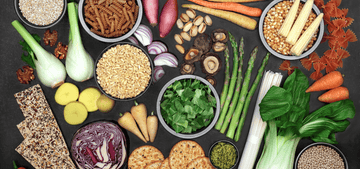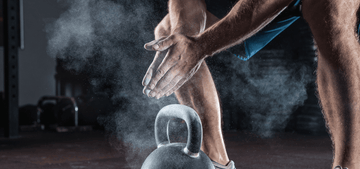The Sleep Research Society and American Academy of Sleep Medicine recommend a minimum of 7 hours of sleep a night, and according to the CDC, over a third of Americans don’t meet this target.(1)
It’s concerning, as getting enough sleep may provide a number of health benefits. If you regularly work out and are trying to build muscle, it’s even more important, and if you’re Vegan, sleep quality could be just as important as your chosen protein source and whether you’re getting enough omega-3 fatty acids or not (check out Ahiflower for a great source of vegan omega 3).
Key Takeaways:
- Adequate Sleep Enhances Athletic Performance: Extending sleep leads to faster sprinting, greater serve accuracy, and improved athletic performance among athletes.
- Sleep Quality Correlates with Muscle Strength: Good sleep quality is associated with greater muscle strength, showcasing the importance of sleep in physical conditioning.
- Sleep Promotes Muscle Recovery and Growth: Adequate sleep facilitates muscle recovery and growth by balancing hormones like testosterone and reducing stress markers.
The Links Between Rest and Fitness Gains
Some people note that it’s easier to fall asleep after switching to a vegan diet. It happens…and could be the result of more balanced glucose levels, fewer digestive issues, and even a reduction in alcohol and caffeine, both of which can impact sleep. But regardless of your diet, you can benefit from getting at least 7 hours a night, with studies suggesting the following:
Sleep could improve athletic performance
Sleep and athletic performance are closely linked. More of the former could lead to better results in the latter.
The American Academy of Sleep Medicine published a study back in 2009 that highlighted the importance of sleep in athletic recovery. It tested how much of an effect extended sleep had on athletes and found extremely positive effects across the board.(2)
After prolonging their sleep, tennis players sprinted faster (from an average of 19.12 to 17.56 seconds) and reported a greater serve-hitting accuracy (returning 15.61 serves compared to 12.6). Hitting depth also improved.
The athletes in question were all women aged between 18 and 21.
Sleep could enhance muscle strength
“Good sleep quality is associated with greater muscle strength”. That was the conclusion of a 2017 study on Chinese university students.(3)
Over 10,000 students were involved in the study, all aged between 16 and 30. Handheld digital dynamometers were used to measure strength, with sleep quality and sleep length being measured using questionnaires.
If you’ve ever hit the gym after a night of tossing, turning, and struggling to sleep, you may have experienced these effects yourself. It can be difficult to push yourself as hard as you usually do and lift as much as you commonly would.
Sleep could increase muscle recovery and growth
Your muscles recover and grow during sleep, and if you don’t sleep enough, they will struggle to grow as easily. Studies show that sleep deprivation can reduce testosterone and increase cortisol, thus decreasing protein synthesis and potentially hindering growth.(4)
Your body also needs rest days for muscle growth. When you exercise, you create microscope tears in muscle tissue. When you rest, the tissue heals, grows, and creates stronger muscles. If you’re constantly working out, you’re not giving your muscles time to heal, and if that’s compounded by minimal sleep, it’s all stress and no rest for your body.
Sleep for Mental and Physical Health
It’s not just your health that’s at risk when you don’t get enough sleep.
A meta-analysis of 6 studies (spanning over 1 million participants) found a possible link between sleep deprivation and diabetes. It’s obviously not the only risk factor, but it’s notable nonetheless, as researchers concluded that lack of sleep was comparable to other risk factors.(5)
Sleep-deprived individuals also struggle with inhibition and self-control, and if this is your first foray into plant-based muscle repair and you’ve spent years eating meat/dairy, that could be very bad news. It means you’re more likely to give up on your diet and exercise regime.(6)
Vegan Sleep Quality: How to Get Your Forty Winks
To some people, getting at least 7 hours of sleep can be harder than any drastic dietary change or demanding workout. You toss, you turn, you overthink, and before you know it, morning has arrived and the night has passed you by.
If that sounds like you, here are some quick tips that could help you sleep easier:
- Create a ritual—go to bed at the same time and wake up at the same time
- Take a long soak in the bath before bedtime
- Turn off your phone before going to bed or activate “sleep mode”
- Read a book or magazine to wind down
- Remove distractions from the bedroom (including phones and computers)
- Avoid eating large meals before you sleep
- Abstain from caffeine at least a few hours before bed
- Don’t drink too much or rely on alcohol to sleep
- Save your workout until the evening or exercise before going to bed
- Don’t watch TV in the bedroom before you go to sleep
- Invest in some soft mood lighting or play a little relaxing music if it helps
- Try to breathe deeply and practice meditation while lying in bed
Supplements can also help. These natural sleep aids won’t leave you groggy and are typically non-addictive with a low risk of side effects. One of the most interesting is something known as KSM-66, and it is generating a lot of excitement in the field of plant-based rejuvenation techniques.
Ashwagandha KSM-66
KSM-66 is a variant of Ashwagandha (Withania somnifera), an herb that has been used in Ayurvedic medicine for many centuries and has also attracted a following in the West.
A study published in Cureus in 2019 found that ashwagandha root could improve the length and quality of sleep. Researchers took two groups, giving ashwagandha KSM-66 to one and using the other as a control group. After 10 weeks, the ashwagandha group experienced significant improvements in sleep onset latency, wake time, and total sleep time.(7)
They also reported improvements in mental alertness after waking.
There are a number of other benefits associated with KSM-66, which is why it’s included in Clean Machine Cell Block 80. To experience these results for yourself, pick up a bottle, take as advised on the label, and combine it with some of the above sleep tips.
Lavender and chamomile are also helpful in treating sleep disorders and are often used as part of plant-based restorative practices. Lavender is added to everything from massage oils and bath bombs while chamomile is typically consumed as a tea or extract.
As with ashwagandha, these soothing herbs are all-natural and well-tolerated, but you should always consult your healthcare professional before starting on a new course of supplements, especially if you’re pregnant, have a preexisting illness, or take prescription medication.
Can You Get Too Much Sleep?
7 to 9 hours is the typical recommended range for sleep. Any less than this and you may experience some of the issues highlighted above. But sleeping for over 9 hours can be just as problematic.
A sample survey of 24,671 adults assessed the impact of sleep times and found that oversleeping was associated with psychiatric diseases and high body mass index. Correlations have also been found between oversleeping and depression, diabetes, and even higher risk of mortality from medical conditions.(8)(9)
Summary: The Benefits of Sleep for Vegan Muscle Recovery and Growth
There are a number of plant-based recovery strategies that can help you to build muscle, improve strength, and reach your fitness goals. There are also supplements that can help with everything from pre-workout fatigue to muscle repair and strength gains.
But throughout all of this, you should never underestimate the power of sleep. Try to aim for at least 7 hours a night. Get as much as 9 if it makes you feel better, but don’t overdo it.
For more vegan recovery tips and other advice on plant-based living, check out this guide to the benefits of BCAAs (as well as our Clean BCAAs) and this one on advanced vegan meal planning.
References
Study: 1 in 3 adults don’t get enough sleep
- Conclusion: More than a third of American adults are not getting enough sleep on a regular basis.
- Link: CDC Report
Study: Sleep Extension Improves Athletic Performance And Mood
- Conclusion: Results of the study indicated that sleep extension in athletes was associated with a faster sprinting drill (approximately 19.12 seconds at baseline versus 17.56 seconds at end of sleep extension), increased hitting accuracy including valid serves (12.6 serves compared to 15.61 serves), and hitting depth drill (10.85 hits versus 15.45 hits).
- Link: ScienceDaily
Study: Relationship between sleep and muscle strength among Chinese university students: a cross-sectional study
- Conclusion: Good sleep quality is associated with greater muscle strength, while short sleep duration may be a risk factor for decreased muscle strength in university students.
- Link: PubMed Central
Study: Sleep and muscle recovery: endocrinological and molecular basis for a new and promising hypothesis
- Conclusion: …sleep debt decreases the activity of protein synthesis pathways and increases the activity of degradation pathways, favoring the loss of muscle mass and thus hindering muscle recovery after damage induced by exercise.
- Link: PubMed
Study: Sleep disturbances compared to traditional risk factors for diabetes development: Systematic review and meta-analysis
- Conclusion: …the risk of developing diabetes associated with sleep disturbances is comparable to that of traditional risk factors. Sleep disturbances should be considered in clinical guidelines for type 2 diabetes screening.
- Link: PubMed
Study: Self-regulation and social behavior during sleep deprivation
- Conclusion: Sleep deprived individuals performing tasks with social components show altered brain activity in areas of the prefrontal cortex implicated in self-control, inhibition, evaluation, and decision-making, in proximity to mesocorticolimbic pathways to reward and emotional processing areas.
- Link: PubMed
Study: Efficacy and Safety of Ashwagandha (Withania somnifera) Root Extract in Insomnia and Anxiety: A Double-blind, Randomized, Placebo-controlled Study
- Conclusion: Ashwagandha root extract is a natural compound with sleep-inducing potential, well tolerated and improves sleep quality and sleep onset latency in patients with insomnia at a dose of 300 mg extract twice daily. It could be of potential use to improve sleep parameters in patients with insomnia and anxiety, but need further large-scale studies.
- Link: Cureus
Study: The Risks of Sleeping “Too Much”. Survey of a National Representative Sample of 24671 Adults (INPES Health Barometer)
- Conclusion: In the general population, sleeping too much was associated with psychiatric diseases and higher BMI, but not with other chronic medical diseases.
- Link: PubMed Central
Study: Oversleeping: Bad for Your Health?
- Conclusion: … sleeping too much could also be problematic? Oversleeping is associated with many health problems.
- Link: Johns Hopkins Medicine




